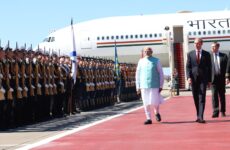Moscow, Proclaiming that “the main, most dangerous part of the war is already in the past,” President Petro O. Poroshenko of Ukraine said on Thursday that his country should aggressively pursue closer ties with the European Union and that he would lead efforts to fight corruption and improve the economy.
Speaking at a news conference in Kiev, the capital, Mr. Poroshenko suggested that Ukraine would ultimately seek membership of the European Union. Earlier in the day, he and other officials, including the prime minister, Arseniy P. Yatsenyuk, said that the government would work to repeal a 2010 law barring Ukraine from membership in any military and political alliance, a step viewed as a prelude to an application to join NATO.
“Yes, we cast away the tyranny, confirmed our European choice and survived the fight with the external enemy,” Mr. Poroshenko said at the news conference. “But the internal challenge is just as important. Corruption, poverty and economic weakness is our biggest threat and the main weapon of the attackers.”
Regarding the pursuit of closer ties with Europe, Mr. Poroshenko said, “We have a full right to knock on this door,” adding that it would require drastic economic and political reforms.
“We must not walk but run this path of huge changes,” Mr. Poroshenko said. “We must run, fly on this path.”
His comments were certain to cause discomfort in Russia, where the Kremlin has been a strong backer of the cease-fire agreement signed on Sept. 5 in Minsk, Belarus, which has sharply reduced the violence in eastern Ukraine.
On Sept. 16, Ukraine ratified an association agreement with Europe that was supposed to lower trade barriers and encourage economic and political reforms in the country. But fierce opposition from Russia prompted Ukraine and the European Union to postpone implementation of much of the agreement until the beginning of 2016. Russia had threatened stiff trade barriers against goods not already under embargo that are produced in Ukraine, which is heavily dependent on trade with its giant neighbor. The Russian government also hinted at a military response.
Despite sporadic fighting, the truce signed in Belarus has mostly held. Russia, however, has made clear that it wants the pro-Russian regions of eastern Ukraine to be given enough authority to block any step by Ukraine to join NATO.
The truce agreement also included provisions intended to grant greater political autonomy in the east, including local and regional elections, as well as legal guarantees regarding the use of the Russian language.
Already, however, a potentially serious dispute appeared to be emerging over when the local elections would be held. A law passed by the Ukrainian Parliament granting “special status” to the eastern regions called for elections to be held on Dec. 7, but leaders of the separatist movement in eastern Ukraine have declared that voting will be held on No.
National parliamentary elections in Ukraine are scheduled for Oct. 26, and it is still unclear whether the government will be able to successfully organize voting in the east. More than 3,000 people have died there since fighting began in April, and tens of thousands have fled the region.
More than a decade ago, Ukraine set a policy of seeking closer ties with Europe and membership in the European Union, but the country took a sharp turn toward Russia under President Viktor F. Yanukovych, who was elected in 2010. At his urging, the Parliament adopted a law to enshrine Ukraine’s “nonaligned” status.
Mr. Yanukovych was ousted in February after months of street protests, which began in November after he broke a promise to sign agreements strengthening political and trade ties with Europe. Since then, Ukrainian officials have put the country back on a pro-European track.
At the news conference on Thursday, Mr. Poroshenko sought to clarify the extent of the autonomy that would be granted to the eastern regions of Luhansk and Donetsk, which he said was limited to a “special regime of local authorities.”
“None of the central functions are delegated,” Mr. Poroshenko said. “Separation of this region from Ukraine is out of the question. We only have a process of decentralization. It is beginning throughout the country.”
The government in Kiev has repeatedly stressed the idea of “decentralization” as opposed to the concept of “federalization” favored in Moscow and among pro-Russian separatists.
Mr. Poroshenko said that the Kremlin had underestimated Ukraine’s strength.
“Some people in the Russian administration thought that Ukraine was a colossus on clay legs, and that once you push it a little, Donbass will fall apart,’’ he said, referring to the southeast region of the country. “It didn’t work out.”




 Driving Naari Programme launched in Chandigarh
Driving Naari Programme launched in Chandigarh






























